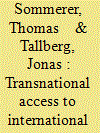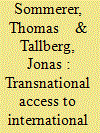|
|
|
Sort Order |
|
|
|
Items / Page
|
|
|
|
|
|
|
| Srl | Item |
| 1 |
ID:
178727


|
|
|
|
|
| Summary/Abstract |
While a dominant position in research on compliance holds that enforcement is necessary for states to abide by their international commitments, many international organizations (IOs) do not have recourse to such coercive means. This article offers the first systematic analysis of one prominent alternative to material coercion: compliance reporting by IOs. It develops an argument for why reporting by IOs should lead states to correct non-compliant behavior, and when those effects should be particularly strong. It tests this argument in the context of the International Labour Organization (ILO), which offers a unique setting for evaluating the impact of reporting in the absence of coercion. The principal findings are threefold. First, reporting has significant and durable effects on state respect for labor rights. Second, reporting affects compliance both immediately and when repeated over longer periods of time. Third, reporting has stronger effects on improvements in labor rights when target states are democratic and resourceful, and have a stronger presence of labor NGOs. By contrast, it does not matter to reporting’s effect whether states are highly economically dependent on the outside world or whether reporting is coupled with active shaming of non-compliant states. Taken together, our results suggest that existing research has not fully appreciated the potential of monitoring systems based on reporting to generate compliance with international rules. While hard enforcement may still be important, especially in areas where incentives to renege are strong, the findings of this article suggest that it is not the exclusive path to compliance.
|
|
|
|
|
|
|
|
|
|
|
|
|
|
|
|
| 2 |
ID:
165169


|
|
|
|
|
| Summary/Abstract |
While extensive research shows that policies and institutions spread across states through processes of diffusion, we know little about diffusion among international organizations (IOs). We develop a novel approach for the study of diffusion among IOs. This approach consists of three components: a theoretical focus on connectivity among IOs as pathways for diffusion; a conceptual differentiation between alternative types of convergence effects; and a methodological strategy combining dyadic and spatial analysis of diffusion. We illustrate the usefulness of this approach through an empirical case: the diffusion of participatory governance arrangements among IOs from 1970 to 2010. The analysis shows that connectivity among IOs contributes to convergence, which typically is manifested through imitation of very specific institutional models. The article's findings have implications both for the study of IOs and for the general study of diffusion.
|
|
|
|
|
|
|
|
|
|
|
|
|
|
|
|
| 3 |
ID:
084823


|
|
|
|
|
| Publication |
2008.
|
| Summary/Abstract |
In recent years, there is growing interest in the study of cross-national policy convergence. Yet we still have a limited understanding of the phenomenon: Do we observe convergence of policies at all? Under which conditions can we expect that domestic policies converge or rather develop further apart? In this article, we address this research deficit. From a theoretical perspective, we concentrate on the explanatory power of three factors, namely international harmonization, transnational communication, and regulatory competition. In empirical terms, we analyze if and to what extent we can observe convergence of environmental policies across twenty-four industrialized countries between 1970 and 2000. We find an impressive degree of environmental policy convergence between the countries under investigation. This development is mainly caused by international harmonization and, to a considerable degree, also by transnational communication, whereas regulatory competition does not seem to play a role.
|
|
|
|
|
|
|
|
|
|
|
|
|
|
|
|
| 4 |
ID:
134976


|
|
|
|
|
| Summary/Abstract |
Past decades have witnessed a shift in international cooperation toward growing involvement of transnational actors (TNAs), such as nongovernmental organizations, multinational corporations, and philanthropic foundations. This article offers a comprehensive theoretical and empirical account of TNA access to IOs. The analysis builds on a novel data set, covering formal TNA access to 298 organizational bodies from fifty IOs over the time period 1950 to 2010. We identify the most profound patterns in TNA access across time, issue areas, policy functions, and world regions, and statistically test competing explanations of the variation in TNA access. The central results are three-fold. First, the empirical data confirm the existence of a far-reaching institutional transformation of IOs over the past sixty years, pervading all issue areas, policy functions, and world regions. Second, variation in TNA access within and across IOs is mainly explained by a combination of three factors: functional demand for the resources of TNAs, domestic democratic standards in the membership of IOs, and state concerns with national sovereignty. Third, existing research suffers from a selection bias that has led it to overestimate the general importance of a new participatory norm in global governance for the openness of IOs.
|
|
|
|
|
|
|
|
|
|
|
|
|
|
|
|
| 5 |
ID:
154917


|
|
|
|
|
| Summary/Abstract |
This article introduces a new data set on the access of transnational actors (TNAs) to international organizations (IOs). While IOs were long the exclusive preserve of member governments, recent decades have witnessed a shift toward more inclusive forms of governance, involving participation by non-governmental organizations, philanthropic foundations, multinational corporations, and other forms of TNAs. Yet existing research has lacked the data necessary to map this phenomenon and its variation over dimensions such as time, issue areas, and world regions. The TRANSACCESS data set is designed for this purpose and contains information on the level of openness in 298 bodies of 50 IOs from 1950 to 2010. On the basis of this data set, we also introduce a first quantitative measure of institutional openness in the shape of a composite index, available at both the IO and body levels. This index can be used to compare TNA access across and within IOs but also as a variable in large-N studies on global and regional governance, where IO openness is potentially relevant.
|
|
|
|
|
|
|
|
|
|
|
|
|
|
|
|
| 6 |
ID:
156223


|
|
|
|
|
| Summary/Abstract |
This article introduces a new data set on the access of transnational actors (TNAs) to international organizations (IOs). While IOs were long the exclusive preserve of member governments, recent decades have witnessed a shift toward more inclusive forms of governance, involving participation by non-governmental organizations, philanthropic foundations, multinational corporations, and other forms of TNAs. Yet existing research has lacked the data necessary to map this phenomenon and its variation over dimensions such as time, issue areas, and world regions. The TRANSACCESS data set is designed for this purpose and contains information on the level of openness in 298 bodies of 50 IOs from 1950 to 2010. On the basis of this data set, we also introduce a first quantitative measure of institutional openness in the shape of a composite index, available at both the IO and body levels. This index can be used to compare TNA access across and within IOs but also as a variable in large-N studies on global and regional governance, where IO openness is potentially relevant.
|
|
|
|
|
|
|
|
|
|
|
|
|
|
|
|
|
|
|
|
|